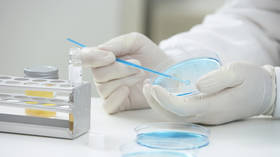Extreme gonorrhoea & superbugs to be vanquished by ‘POISON ARROW’ drug, researchers claim

Scientists at Princeton University, New Jersey have made a groundbreaking discovery that could revolutionize antibiotic development: A new drug that works like a ‘poison arrow’ to kill superbugs before they can develop resistance.
Drug-resistant bacteria, or superbugs, are enough to keep anyone awake at night. Since Alexander Fleming discovered penicillin in 1928, we have been relying ever more on antibiotic drugs to combat bacterial infections. Bacteria’s short life-cycle, however, makes them excellent at quickly becoming resistant to our best treatments — and when they do, the battle to find new ‘weapons’ must begin anew.
And bacteria are winning the arms race. As it stands, superbugs kill around 700,000 people a year worldwide, and could overtake cancer in mortality rates by 2050. Already, common strains like Escherichia coli and Klebsiella pneumoniae are resistant to most or all known antibiotics. These are both Gram-negative bacteria, which have an additional protective membrane that makes them harder to kill. For this reason, the World Health Organization has placed Gram-negative bacteria at number one on their list of “priority” pathogens, and made superbugs a critical issue for global human health.
Poison arrow
The new drug, whose technical name is SCH-79797, but has been dubbed 'Irresistin', has a dual action. First, it pierces the outer membrane of the bacteria. Second, it injects its cargo; a poisonous compound that destroys the bacterial DNA, thus killing the cell.
Also on rt.com Rush to trash hydroxychloroquine based on faulty Surgisphere data exposes fundamental flaws in profit-based medical ‘science’The scientists tested Irresistin against Neisseria gonorrhoeae or super-gonorrhoea, a ferocious strain of the venereal disease which is the third-most common in Britain, and resistant to all known antibiotics. According to Professor Zemer Gitai, the lead author of the paper, super-gonorrhoea is “circulating on college campuses.”
But in the lab as well as in mice, Irresistin made short work of it. The problem, though, was that Irresistin also killed human cells, and wasn’t safe. So the scientists have created a tweaked form called Irresistin-16 that kills 1,000 bacteria for every one human cell.
A lost art
Drug discovery of this kind is something of a lost art — a new class of antibiotics targeting Gram-negative bacteria has not been discovered since the 1960s. In the words of Stanford University microbiology professor KC Huang, “antibiotic research has stalled over a period of many decades.”
So bugs have been evolving a resistance to all of our antibiotics without anything new being developed to step in, in what has been a one-way ticket hurtling toward disaster. Hopefully, the train has begun to slow down, if it is not yet turning around.
Also on rt.com Scientists explain WHY people with A blood type are more susceptible to Covid-19Think your friends would be interested? Share this story!














